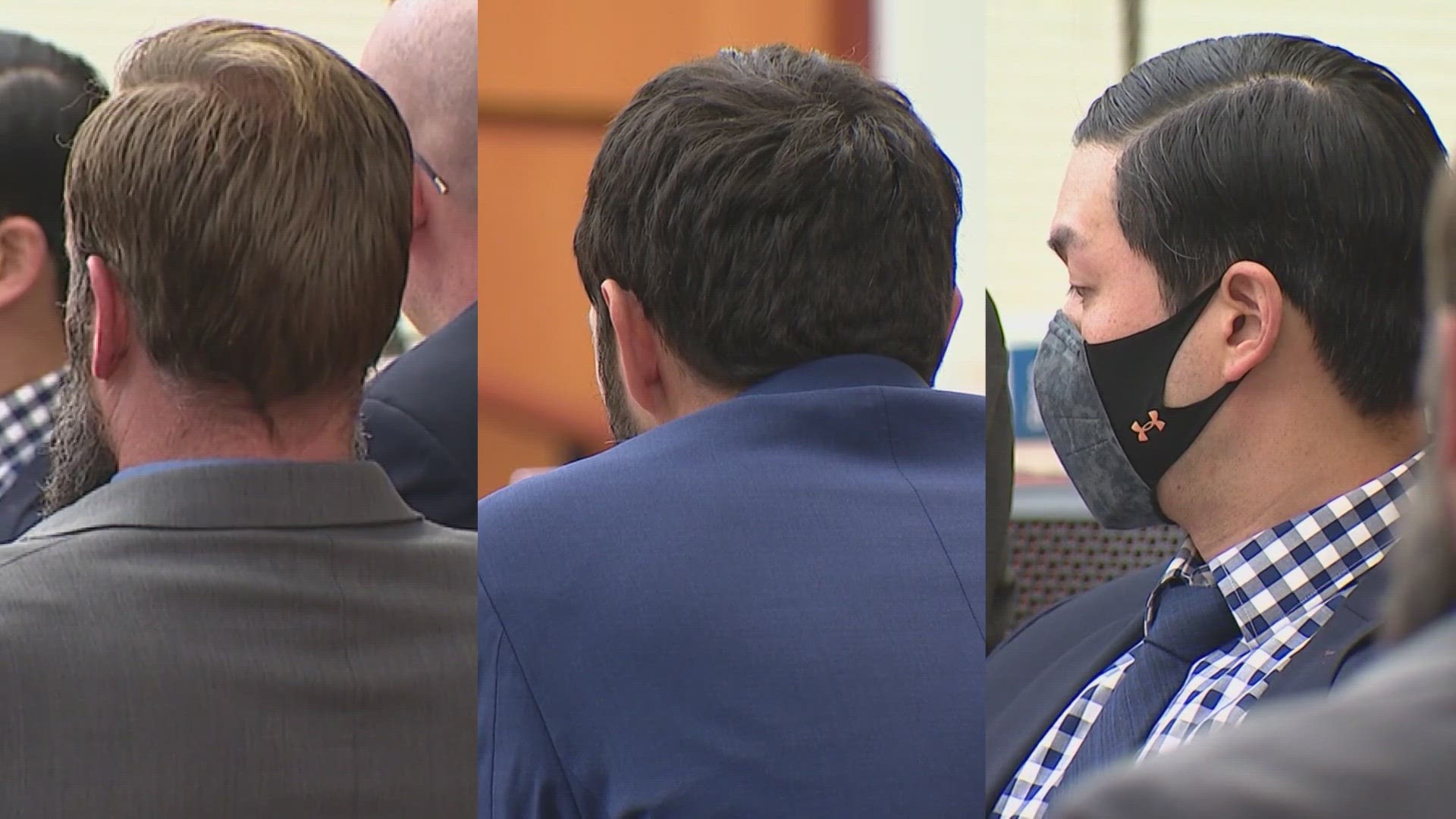TACOMA, Wash. — Jury deliberations are underway in the trial of three Tacoma police officers charged in the death of Manuel Ellis.
The officers face charges in connection to a March 3, 2020 confrontation where officers struck and Tased Ellis, placed him in handcuffs and a hobble, and applied pressure to his back while he was facedown. Ellis died in police custody.
Police officers Christopher Burbank, Matthew Collins and Timothy Rankine are on trial. Burbank and Collins are charged with second-degree murder, and all three officers are charged with first-degree manslaughter.
This is the first time the Washington State Attorney General's Office has criminally charged police officers for the unlawful use of deadly force, according to the 2021 announcement of the charges. Since the passing of Initiative 940 police accountability law, the charges against the officers are the second time homicide charges have been filed against Washington police officers, according to the attorney general's office.
All three of the officers pleaded not guilty and are free on bail. They remain on paid administrative leave from the Tacoma Police Department.
What are the charges?
Burbank and Collins are charged with second-degree murder. If convicted, the standard sentencing range with no prior criminal history is 10 to 18 years in prison. The maximum penalty for second-degree murder is life imprisonment and a $50,000 fine.
Second-degree murder is defined as when someone causes the death of another person with intent, but without premeditation, according to Washington state law. The charge is also brought forth when someone commits any felony, such as assault or unlawful imprisonment listed as predicated felonies in this case, which then causes the death of a person, state law explains.
Burbank, Collins and Rankine are charged with first-degree manslaughter, which, with no criminal history, can result in a standard range of 6.5 to 8.5 years. The maximum possible penalty is life in prison and a $50,000 fine.
First-degree manslaughter occurs when someone “recklessly causes” the death of another, according to state law.
Former Pierce County Prosecuting Attorney Mark Lindquist said the two charges against Burbank and Collins allow the state to explore two theories in how they may have contributed to Ellis' death.
“Some prosecutors believe you choose one theory and stick to it, other prosecutors like to give themselves backup positions,” he said. Manslaughter is a lesser charge than murder, but if convicted, the prosecution will still see a guilty verdict as a victory, he added.
A key distinction of this case is the amount of video evidence. Burbank and Collins are captured on at least three different videos striking Ellis and struggling with him both while standing and on the ground. There is little to no video of Rankine's direct interactions with Ellis.
How does I-940 impact this case?
In 2018, Washington voters approved I-940, a measure changing the state’s controversial law on police shootings to lower the bar for prosecuting police who use deadly force.
The updated law removes the element of proving malice under state law, making it easier to prosecute police officers in situations where deadly force is used. It also changes the law to consider what a "reasonable officer" may have done under the circumstances and takes into account the officer's intentions and if they acted in good faith.
“To prove felony murder, you have to prove an intentional assault that resulted in the death of a victim,” Lindquist said.
What must the state and defense prove?
The Washington State Attorney General's Office must prove that the force used by the officers was unreasonable and that the force caused Ellis' death. On Wednesday, Special Prosecutor Patty Eakes told jurors that they don't have to decide if the officers' actions were the sole cause of Ellis' death, only if their actions were one of the contributing factors.
The defense attorneys are working to prove that the officers' use of force against Ellis was reasonable and necessary.
An instruction has been provided to the jury that they cannot view Rankine as an accomplice to Burbank and Collins, and vice versa. There is little to no difference between Collins' and Burbank's role in Ellis' death, Lindquist said.
“Officers, unlike other criminal defendants, are public servants,” Lindquist said. “We all expect public servants to be able to explain their behavior because they work for us.”
Both officers Rankine and Collins took the witness stand; Burbank did not testify. Lindquist said this allowed Rankine to explain his actions of controlling Ellis to the jury and allowed Collins to explain how the confrontation started — something that was not captured anywhere on video.
“By officer Burbank not testifying, we’re left with just officer Collins' explanation of how this started,” he said. “Collins' version becomes the only version that the jurors have heard."
How this trial sets a precedent
What precedent is set by this historic trial will be determined after the jury delivers its verdict, Lindquist said. The case itself acted as a pendulum, he explained. Before the passing of I-940, it was too difficult to charge officers with murder due to the need to prove malice.
If the jury finds any of the officers guilty, it will send the message that officers should be held accountable to a degree for their actions. However, “if the jury acquits all three officers, I think that sends the message that this case tried to go too far in holding officers accountable,” he said.
Good-faith mistakes by police officers can, and should be, solved through civil litigation, he said. These lawsuits hold government agencies accountable, which can lead to changes such as better training, updated protocols or other changes in police conduct.
“Increased police accountability is a good thing for the community,” Lindquist said. “We want to send the message that no one is above the law and secondly, accountability results in better conduct.”

